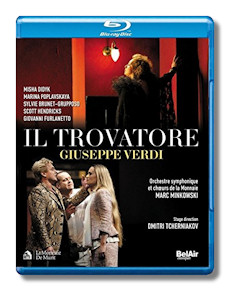
The Internet's Premier Classical Music Source
Related Links
- Verdi Reviews
- Latest Reviews
- More Reviews
-
By Composer
-
Collections
DVD & Blu-ray
Books
Concert Reviews
Articles/Interviews
Software
Audio
Search Amazon
Recommended Links
Site News
 Blu-ray Review
Blu-ray Review
Giuseppe Verdi

Il Trovatore
- Misha Didyk - Manrico
- Marina Poplavskaya - Leonora
- Scott Hendricks - Count di Luna
- Sylvie Brunet-Grupposo - Azucena
- Giovanni Furlanetto - Ferrando
Choeurs de la Monnaie
Orchestre symphonique de la Monnaie/Marc Minkowski
Dmitri Tcherniakov - Stage Director & Set Design
Costume Design - Dmitri Tcherniakov & Elena Zaytseva
Lighting Design - Gleb Filshtinsky
Recorded Live at Théâtre Royal de la Monnaie, Brussels, Belgium - June, 2012
Bonus feature - Interview with Dmitri Tcherniakov
BelAir Classiques Blu-ray BAC408 143+15m PCM Stereo DTS-HD Master Audio
Also available on DVD BAC108: Amazon - UK - Germany - Canada - France - Japan - ArkivMusic - JPC
This was a controversial production staged in Brussels in June, 2012. It is an "updated" version of the opera by Dmitri Tcherniakov, who gives the story not only a contemporary setting but also has the action retold and reenacted as a sort of play within a play. The cast is reduced to the opera's five main characters, thus leaving out Ines and Ruiz but having their words sung by the others. The action takes place in a large hotel room, where the characters role-play through the story and its tragic events. All five characters remain on stage throughout most of the story, even when they're not really a part of the action. Ah – but it is during these times that they often react with facial expressions of jealously, humor, revulsion or whatever. As things progress the Count di Luna character becomes increasingly agitated and menacing and then violent.
Well, I don't want to give away the whole story/concept, but suffice it to say that this role-playing sort of quasi-therapy session works up a storm of emotions and finally of real-life tragedy. You can see that this play within a play concept is intriguing, but you also realize its treatment of the admittedly problematic libretto by Salvadore Cammarano won't exactly be welcomed in traditionalist circles. Personally, I thought Tcherniakov's treatment worked well, giving a more natural flow to the action, somewhat neutralizing the libretto's major flaw, which is that large chunks of the action are skipped over. For example, at the end of Part III Manrico determines to rescue his mother Azucena, but when Part IV begins he has already failed in his attempt and is shown bound and captured. However, here because the concept is a retelling or reenactment, such gaps in the action seem far less egregious. Moreover, the performances by the singers and musicians here are quite good, making a fine case for this unusual take on Verdi's ever popular opera.
Misha Didyk as Manrico sings impressively but in a more Russian style: he infuses the character with plenty of emotion, but comes across as slightly cold in places. Yet, he is effective on his own terms: his Di quella pira, for example, is passionate and well sung and his several numbers near the opera's close are very convincing. Marina Poplavskaya as Leonora is excellent, even if she displays a slightly colder manner as well, especially early on. Her D'amor sull'ali rosee, is beautifully sung, even if, oddly, she's facing away from the audience throughout the entire number. A few moments later she delivers a knockout Tu vedrai ai che amore in terra. It drew quite enthusiastic applause from the audience. Sylvie Brunet-Grupposo as Azucena is also excellent and is clearly the central figure in this version. She sings with utter commitment throughout the opera and her dramatic skills are equally impressive. The rest of the cast is fine and the chorus and orchestra perform admirably. Marc Minkowski leads the proceedings with a knowing hand.
In 2003 I reviewed a more traditional and quite excellent Il Trovatore DVD on the BBC Opus Arte label here (BBC Op. Arts DVD OA0849D) that featured José Cura as Manrico, Verónica Villarroel as Leonora and Dmitri Hvorostovsky as Count di Luna. Two years later I reviewed a Karajan-led, Vienna State performance on a TDK DVD from 1978 that was also a traditional version and which I ranked somewhat better (TDK DVD DVCLOPIT). As for this new Blu-ray on Bel Air Classiques, I would say it is hard to make comparisons owing to the utterly different take on the story. However, from a strictly musical standpoint the performances compare reasonably well with those on the two earlier recordings. In addition, the Bel Air Blu-ray surpasses both in technical respects: the sound reproduction is state-of-the-art, and camera work and picture clarity are superb. There is also a bonus feature that presents an interview with stage director Dmitri Tcherniakov.
Copyright © 2014, Robert Cummings




















